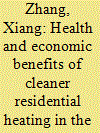|
|
|
Sort Order |
|
|
|
Items / Page
|
|
|
|
|
|
|
| Srl | Item |
| 1 |
ID:
110693


|
|
|
|
|
| Publication |
2011.
|
| Summary/Abstract |
Indoor air pollution from burning solid fuels for cooking is a major environmental health problem in developing countries, predominantly affecting children and women. Traditional household energy practices also contribute to substantial time loss and drudgery among households. While effective interventions exist, levels of investment to date have been very low, in part due to lack of evidence on economic viability. Between 2004 and 2007, different combinations of interventions - improved stoves, smoke hoods and a switch to liquefied petroleum gas - were implemented in poor communities in Nepal, Sudan and Kenya. The impacts were extensively evaluated and provided the basis for a household-level cost-benefit analysis, which essentially followed the methodology proposed by the World Health Organization. The results suggest that interventions are justified on economic grounds with estimated internal rates of return of 19%, 429% and 62% in Nepal, Kenya and Sudan, respectively. Time savings constituted by far the most important benefit followed by fuel cost savings; direct health improvements were a small component of the overall benefit. This paper describes the methodology applied, discusses the findings and highlights the methodological challenges that arise when a global approach is applied to a local programme.
|
|
|
|
|
|
|
|
|
|
|
|
|
|
|
|
| 2 |
ID:
166328


|
|
|
|
|
| Summary/Abstract |
Millions of households in many underdeveloped countries use coal stoves for heating, which remains a major air pollution source. Since 2015, policies for substituting residential coal use with electricity have been implemented at unprecedented levels in the Beijing–Tianjin–Hebei (BTH) region, one of the most severely air polluted areas in China. This study evaluated the health benefits of the residential “coal-to-electricity” policy in the BTH region. We developed an integrated assessment model to investigate the impact of the policy on both the ambient and indoor air quality improvement. The private health benefits from indoor air quality improvements do not justify the costs. However, adding the spillover public health benefits from ambient air quality improvements, the policy brings net social benefits to the BTH region. Compared to a no-policy scenario, Beijing obtains the most health benefits and enjoys the most synergies from regional cooperation among the three provinces/municipalities. Hebei bears the highest cost since it has more households fueled by coal. Our results showing net social benefits provide support for a massive and accelerated implementation of this policy in the BTH region. The provincial distributional results can provide a reference for subsidies from Beijing and Tianjin to Hebei for achieving region-wide implementation.
|
|
|
|
|
|
|
|
|
|
|
|
|
|
|
|
| 3 |
ID:
182790


|
|
|
|
|
| Summary/Abstract |
The health risks from indoor and ambient air pollution create a considerable burden to global economic development and health, especially in economies within an aging society. Previous research has established the adverse effects of air pollution on health. However, most studies do not focus on the simultaneous effect of indoor and ambient air pollution nor its health risks to the older population. This study examines the impact of exposure to both indoor and ambient air pollution for the same individuals over time on mental health by using a nationally representative longitudinal survey for middle-aged and elderly individuals in China. We find that both indoor and ambient air pollution have an adverse effect on elderly mental health and significantly increases the likelihood of having depressive symptoms. We provide evidence that the effect of indoor and ambient air pollution is associated more with less educated and females.
|
|
|
|
|
|
|
|
|
|
|
|
|
|
|
|
| 4 |
ID:
162959


|
|
|
|
|
| Summary/Abstract |
The outcome of household choice depends on the private information available to an agent, particularly in terms of costs and benefits. This study examines the role of information in the adoption of clean cooking fuel in Bhutan. We use a rural subsample of nationally representative data from the 2012 Bhutan Living Standard Survey (BLSS) conducted in all twenty districts. We estimate a bivariate probit model to control for the potentially endogenous information variable. The results indicate that households that have access to information are approximately 39% more likely to adopt clean cooking fuel. Similarly, households are 49% less likely to adopt dirty fuel (firewood) when exposed to information. Other factors such as education, the electricity supply, access to liquidity and the distance to the market are important factors that contribute to adopting clean cooking fuel. The results also show that the effect of information varies depending on the level of education of the household heads, thus highlighting the importance of accounting for the level of education of information recipients when designing a similar information provision.
|
|
|
|
|
|
|
|
|
|
|
|
|
|
|
|
|
|
|
|
|